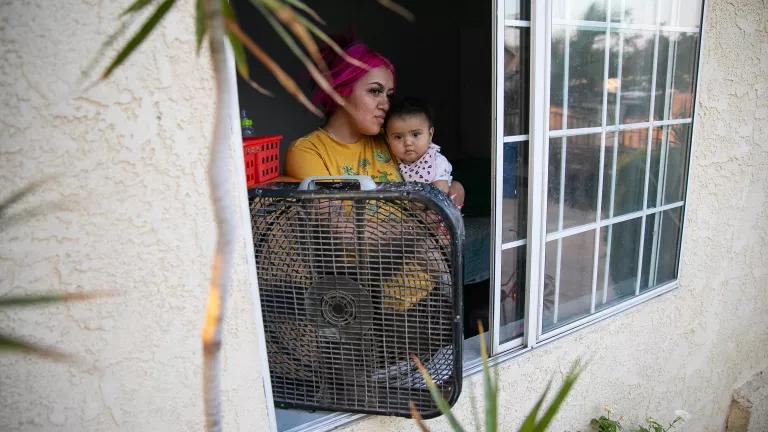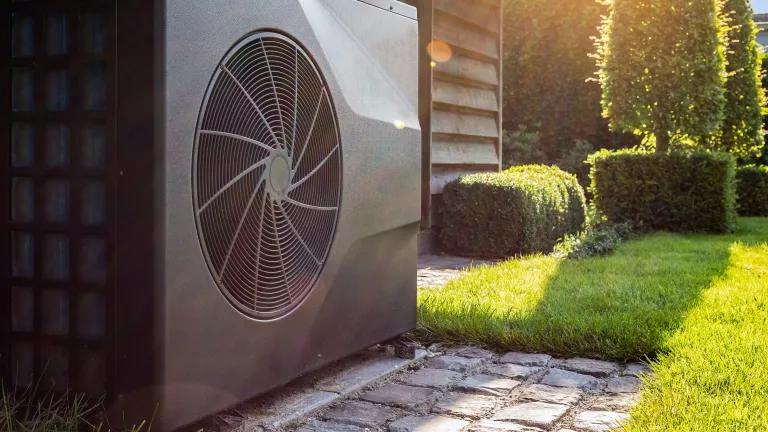
A majority of Californians support innovative ways to reduce climate and air pollution from homes and buildings, including moving from natural gas to super-efficient electric appliances to heat them, according to a new poll. Fortunately, two bills headed for a final vote in the Legislature later this month aim to help provide greater and more affordable access to clean energy in buildings.
The poll shows broad and diverse support for state action to help Californians use clean and climate-friendly technologies. For example, 61 percent back incentives for using clean electricity to heat home and offices. Support for clean heating technologies is high across genders, ethnicities, and California regions. Policies that encourage clean heating technologies receive backing from 65 percent of respondents when the policies also reduce utility bills.
The two active pieces of legislation are directly responsive to Californians’ support for clean and affordable heating technologies. Together, they will reduce climate and air pollution from California’s buildings while saving consumers money on their energy bills. Buildings are responsible for a quarter of the state’s climate-warming pollution and contribute to air pollution, in large part because of heating and hot water systems that burn fossil fuels such as natural gas and propane inside those buildings. Instead, buildings can use cleaner heating options such as efficient electric appliances, renewable natural gas, and solar thermal.
While California’s new building code will ensure that new homes are zero-net electricity by 2020, it doesn’t zero out fossil fuel emissions, and also doesn’t address equipment replacements in existing buildings, which are responsible for the vast majority of building sector emissions. These are critical gaps to close for California to hit its carbon emissions targets by 2030. Senate Bill 1477 by Senator Henry Stern and Assembly Bill 3232 by Assemblymember Laura Friedman seek to close that gap by making clean, climate-friendly technologies more affordable and accessible to all Californians.
AB 3232 requires the California Energy Commission to assess and identify ways for the state to reduce emissions from buildings 40 percent from 1990 levels by 2030, including through efficient electrification or renewable natural gas. This is in line with the state’s carbon-cutting goal for the entire economy. The analysis will provide critical information for future state policy and help lay out a cost-effective pathway to cleaner air and a safer climate for all Californians.
SB 1477 creates incentives to construct new buildings that will operate with almost no carbon footprint and would also help develop the market for new super-efficient clean heating technologies, in much the same way that California’s Solar Initiative kickstarted the growth of solar in the state. Clean technologies for space and water heating, such as high-efficiency heat pumps, are available today, but not many contractors or customers are aware of them. The technology is relatively new—like solar panels were 20 years ago—and while these heat pumps can deliver better long-term energy and utility bill savings, they cost more upfront than conventional heating equipment. There are also a range of other options to lower emissions in buildings - solar thermal, advanced energy efficiency, on-site batteries that store energy from solar PV, and other renewable heating fuels. By establishing a program to educate consumers, train contractors, and provide incentives for low-emissions options, SB 1477 will empower Californians to choose clean and affordable heating technologies when they next replace their furnace or water heater, or buy a new home.
Recent studies from NRDC and the Rocky Mountain Institute (RMI) have both identified the potential of clean heating technologies to play an important role in reducing climate pollution while saving money for consumers. Today, this is especially true for new home construction, customers who use old inefficient electric or propane heaters and water heaters, and homes that bundle efficient heating with rooftop solar systems.
With supportive policies to develop the market, like California is considering, and utility rates that better reflect the cost of supplying energy at different times of day, the cost of using pollution-free electricity will come down—making clean electric heat a more cost-effective option for most Americans. RMI estimates that using clean heating technologies in homes and businesses could cut U.S. carbon pollution by 10 percent. The key is to get more low-emission technologies like heat pumps into more buildings sooner rather than later—which reinforces similar findings in NRDC’s report, which charts a pathway to cut greenhouse gas emissions by at least 80 percent by 2050 and stave off the worst effects of climate change
AB 3232 and SB 1477 will support access to more climate-friendly technologies in homes and office buildings. Polling shows that Californians support this transition—especially if it helps lower their utility bills, which SB 1477 requires. Together these bills provide an important foundation to ensure that clean, climate-friendly technologies become more affordable and can deliver climate and clean air benefits to all Californians.




